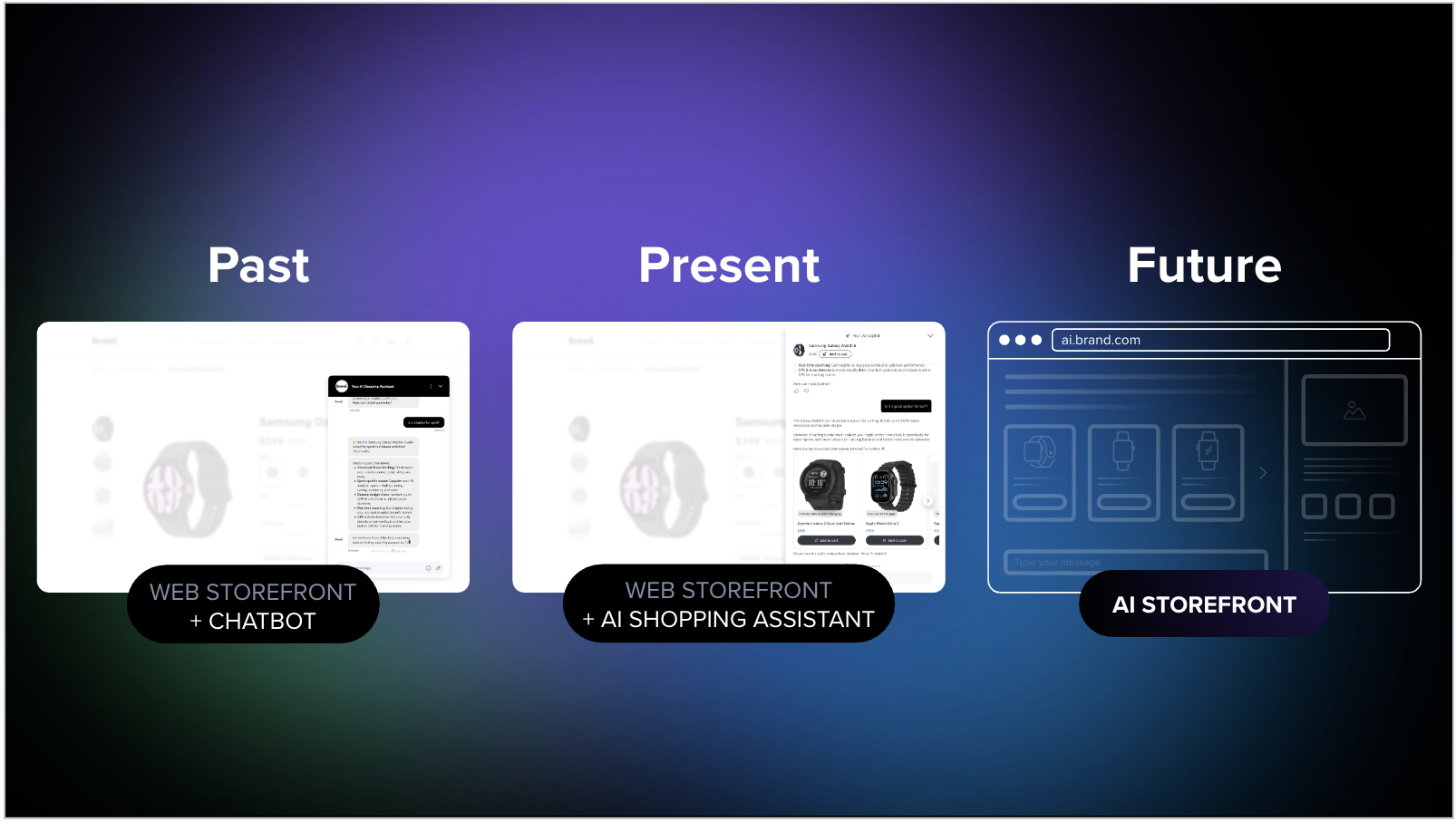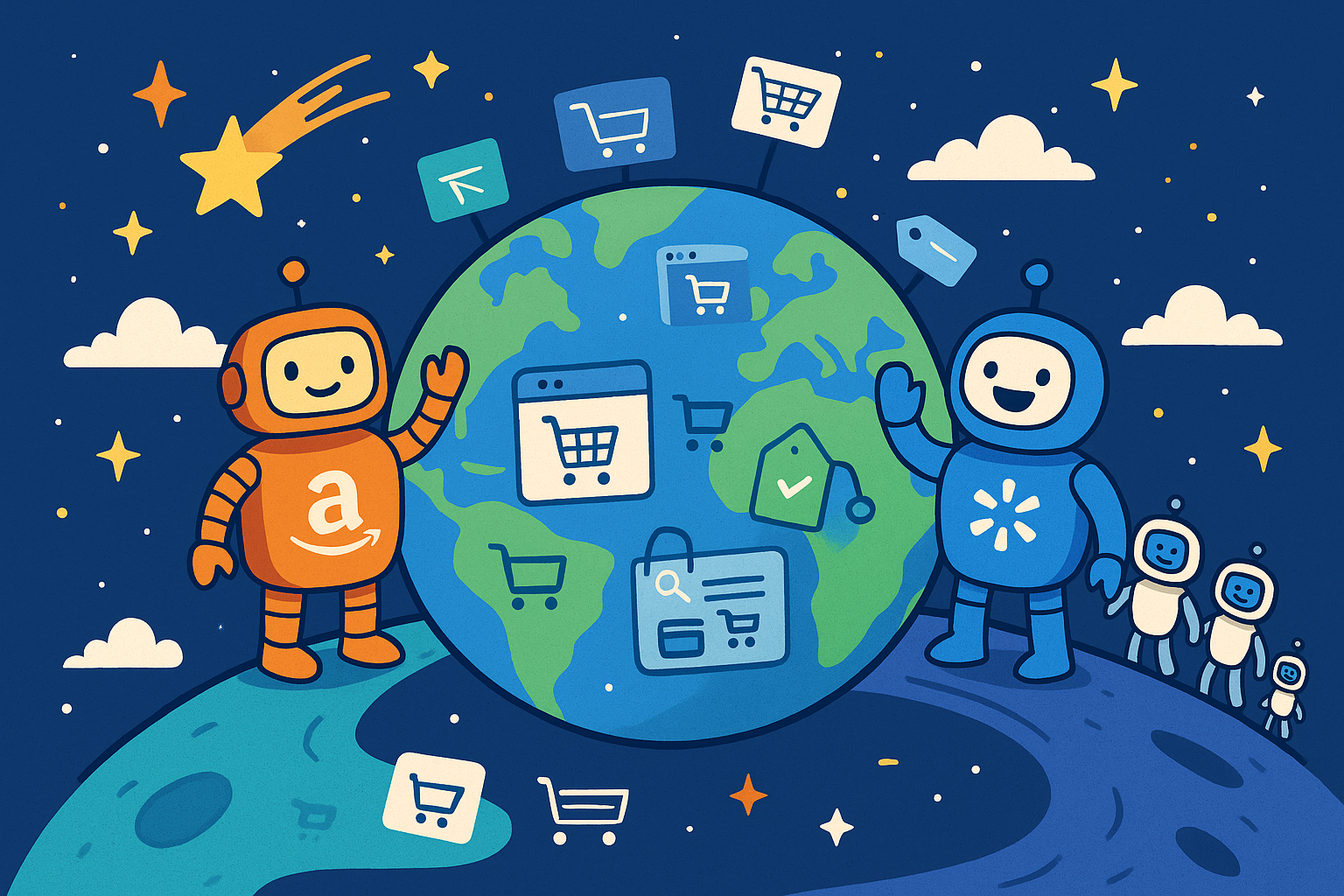How to Master Automated Conversations With AI
iAdvize

Automation has become commonplace online, and we're not just referring to in-house administrative work like data entry. An automated conversation powered by artificial intelligence (AI) can vastly improve customer interactions and increase conversion rates. However, getting the most out of conversational chatbots isn't always easy. This article will dive into the key details to help you succeed.
We're now living in a brave new (digital) world, and this is due in large part to the presence of "smart" algorithms throughout the e-commerce industry. In fact, research suggests that 4 out of 5 American shoppers see the benefits of chatbots, with 61% of online shoppers surveyed highlighting their 24/7 availability and time-saving attributes.
However, conversational chatbots might still be rather new to some people. First, let's explore some general principles, then we'll uncover their benefits to business and how to implement them effectively.
What is an Automated Conversation?
Automated conversations are simply a means by which customers can get specific details of a product or service without the assistance of a human representative. A business will instead employ chatbots powered by generative AI technology to streamline the interactive process, and to provide targeted answers based on individual queries.
Note that the term automated is very important in this context. Modern conversational AI chatbots utilize cutting-edge technology that is a far cry from previous iterations which often suffered from issues such as inaccuracy and robot-like experiences.
They instead deliver personalized results in natural, conversational language within a matter of seconds, dramatically reshaping the end-user experience.
Why Automate Conversations in the Customer Experience?
As an example, some readers may be surprised to learn that on the iAdvize platform, approximately 70% of online conversions were at least partially automated by Q4 2023. This makes sense when we remember that consumers demand more efficient e-commerce experiences than in the past.
Simply stated, time is money for businesses and customers alike. Those who can quickly obtain intelligent answers through the use of smart technology will be more likely to continue with their shopping journey and eventual purchase.
The Role of Conversational AI in Automation
Where does a platform equipped with generative artificial intelligence come into play? Working smart as opposed to hard is perhaps one of the best ways to describe this approach. While chatbots have existed for some time, they often lacked the advanced algorithms required to address highly specific questions.
This could lead to customer service bottlenecks, a poor end-user experience, and in severe cases, they might even cause the client to abandon their cart and shop elsewhere. The synergy of advanced generative AI and cutting-edge bots now dramatically optimizes the entire interaction, while simultaneously saving a great deal of time.
How Conversational AI Automation Works
An automated conversation is much more than a program designed to respond to a predetermined set of queries. Traditional chatbots of this nature lacked the flexibility required to provide truly human-like responses. The new generation of chatbots uses technologies like deep learning and natural language processing (NLP).
This results in the ability to understand the context of a conversation, to engage in open-ended exchanges, and to function similarly to a human counterpart. The fact that these processes are entirely automated can save the customer a great deal of time, and help the company reduce costs, while offering the same level of satisfaction as speaking with a live representative.
Applications of Automated Conversations
There are many ways for an organization to leverage the vast capabilities of AI-powered technology, and this is due in large part to its flexible nature. Let's examine three practical applications, and the associated advantages.
Virtual Shopping Assistants
Conversational chatbots can double as user-friendly sales assistants. From the ability to offer product recommendations based on specific needs, to answering questions associated with a certain item, shoppers now have a wealth of information at their fingertips.
If these programs are unable to address a specific question or concern, the client can still be redirected to agents who will help to fill in the proverbial blanks.
Customer Service Chatbots
There can also be times when an automated conversation serves as a means to bridge the gap between a human representative and the organization.
They're capable of providing additional insights that don't necessarily have to be related to a sale, but rather things like:
- Information about discounts and promotions
- Billing questions
- Refund policies
- Complaint resolution
- Confirming or renewing a membership
These conversation-driven experiences will ultimately result in a higher level of end-user satisfaction, and reflect positively on the brand's reputation.
Automated Social Media Interactions
Social media marketing has become an integral part of the online business community, and chatbots have become an integral part of that. For instance, the messaging service WhatsApp now boasts more than two billion users.
Companies can leverage conversational chatbots through these social platforms to automate interactive customer service and drive sales on these oft-used, off-website channels.
Benefits of Using Conversational AI Automation in E-commerce
Now that we've examined some of the primary applications associated with conversational AI automation, let's highlight three advantages companies can expect to enjoy.
Cost Efficiency
Generative AI chatbots represent some of the most cost effective ways to augment existing customer service solutions. Whether employed as shopping assistants, or as a means to address general service-related inquiries, these systems can free up valuable time within a typical office environment. The good news is that brands won't be forced to sacrifice quality for efficiency.
24/7 Availability
One of the limitations often associated with human assistants involves when a customer can actually reach them. AI chatbots are available 24 hours a day, seven days a week. Regardless of when a customer chooses to contact an organization, help is provided in a matter of seconds.
Improved Customer Experience
The proactive, helpful nature of these bots will inevitably lead to better end-user experiences. Consumer electronics retailer, Vanden Borre, felt that it was important to adopt a system capable of providing autonomous responses while enhancing the buyer's journey.
After deploying generative AI chat technology, Vanden Borre was able to increase its CSAT score by 28 points.
Best Practices: How to Implement Conversational AI Automation
While the benefits of a conversational interface are clear, the real challenge lies in maximizing their potential.
Choosing the Right Automated Conversational Tool
One key area of concern during this evaluation process is privacy. It's crucial that software programs remain in compliance with relevant regional regulations like the California Consumer Privacy Act (CCPA). New legislative guidelines, including the AI Act, are also intended to provide a framework that all businesses must adhere to.
Another things for brands and retailers to consider when assessing new tools is that not all of these platforms have been designed for business use. Choosing an application developed specifically for the e-commerce sector is critical.
Finally, generative AI chatbots aren't intended to replace humans—representatives should remain in the loop to address more complex queries.
Monitoring and Optimizing Your Conversational AI Chatbot
Unlike the first chatbots, modern iterations are much easier to use at scale. This level of flexibility is key when monitoring specific KPIs such as customer satisfaction, conversions, and ROI. Although these systems are incredibly advanced, there may still be times when further optimization is required.
Working with trusted product developers, interpreting real-time analytics, and maintaining a proactive approach is the best way to ensure that businesses are able to make the most out of such unique systems.
Why Conversational AI Automation is Essential for Today's Online Customer Experience
Key Benefits and Takeaways
The e-commerce community has become increasingly competitive, and businesses should always seek to adopt the latest technological advancements.
These are some of the main advantages that automated conversation software can offer:
- Around-the-clock support
- Cost-effective solutions for shoppers and businesses alike
- The ability to free up valuable in-house resources
- Increased levels of customer satisfaction
- Highly automated exchanges
- Human-like insight and advice
- Flexible systems that can be implemented around the needs of the organization
As these virtual agents become more commonplace, there is little doubt that they'll continue to redefine the online shopping experience.
Looking Ahead: Enhanced Personalization at Scale
Conversational AI chatbots will become even more advanced as this technology gains a firm foothold throughout the e-commerce industry. This should come in the form of exchanges that are entirely capable of mimicking human interactions; perhaps to the point that the end-user won't be able to discern the differences between a bot and a live representative.
However, humans are still an integral part of the customer service experience. These chatbots merely represent a means to further enhance the engagement process, and to ensure long-term e-commerce success.

.png)
.png)








